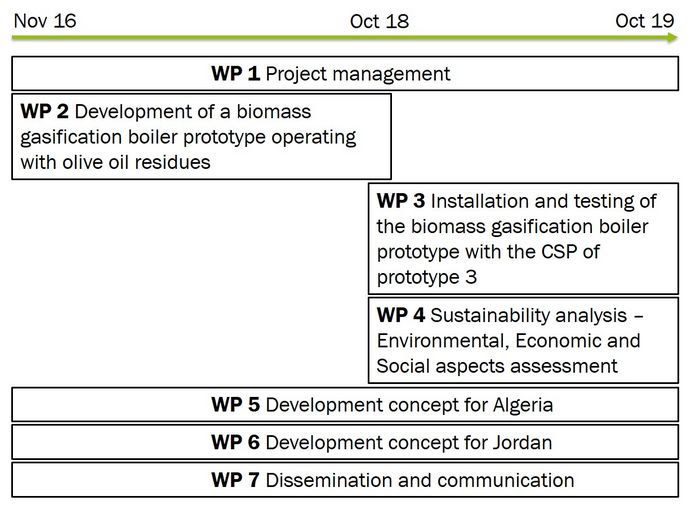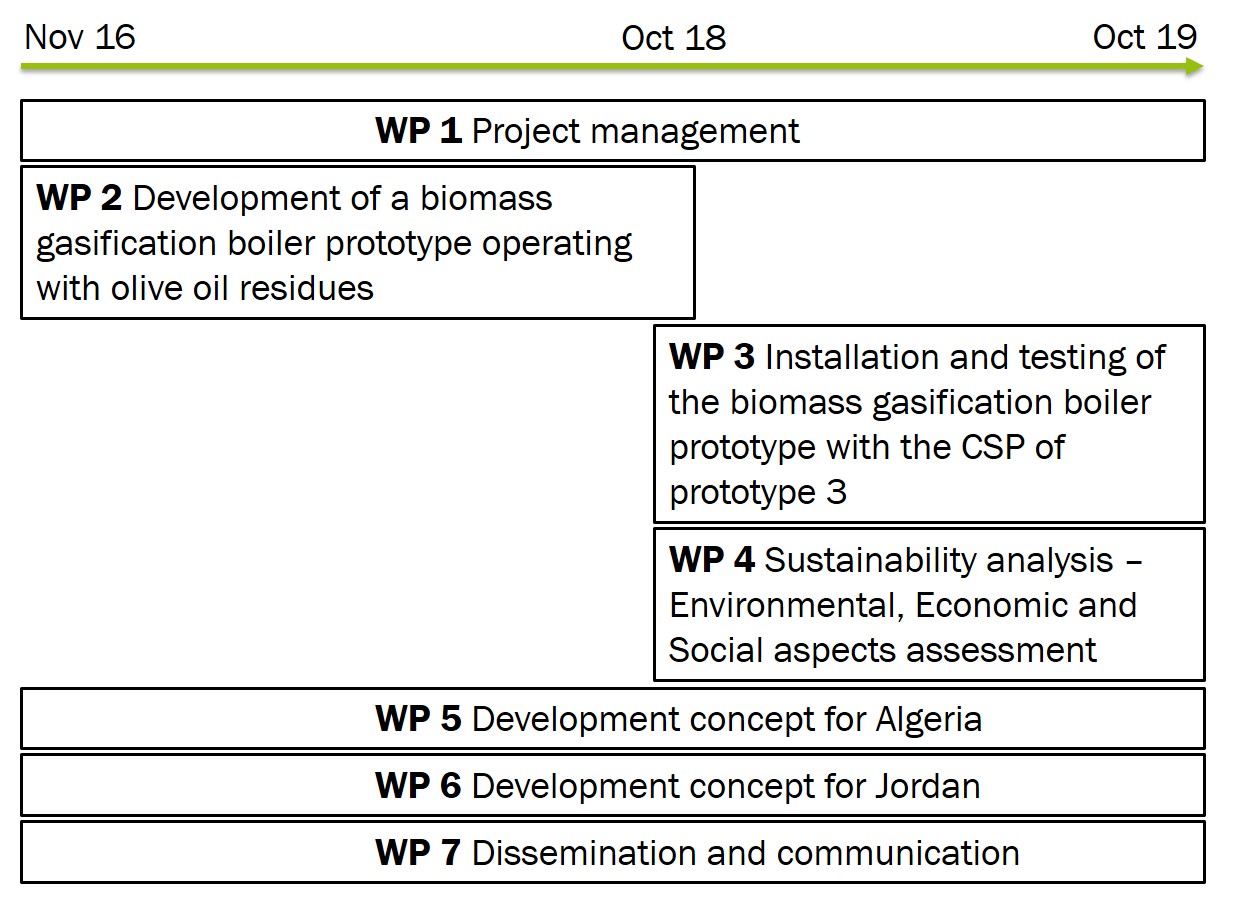Work packages
The details of the research program are given below (WP):
WP 1 Project management
| WP leader: | DBFZ |
| Participants: | All partners |
| Duration: | Month 1-36 |
The coordinator will be in charge of project planning, reports to ERANETMED, verification of milestones and deliverables and budgetary overviews using inputs from the other partners. Six-monthly project meetings will involve all members, so that progress can be discussed in an open forum. The location of these meetings will rotate around the consortium. They will be organized by the hosting partner and the coordinator.
Tasks:
1.1: Project management and coordination
Deliverables:
D1.1 1st year annual report, Month 13
D1.2 2nd year annual report, Month 25
D1.3 Mid-term assessment report, Month 25
D1.4 3rd year annual report, Month 36 → will be cancelled
D1.5 Final report (financial and technical), Month 36
D1.6 Final public report, Month 36
WP 2 Development of a biomass gasification boiler prototype operating with olive oil residues
| WP leader: | Cogebio |
| Participants: | DEEP, ENIT, DBFZ |
| Duration: | Month 1-24 |
Olive pomace gasification prototype development, design and construction through laboratory and pilot studies.
Expected results: Gasification prototype optimized for olive pomace gasification.
Tasks:
2.1: Prototype development (COGEBIO, ENIT, DBFZ)
2.2: Lab tests and enhancement (COGEBIO, DEEP, ENIT, DBFZ)
2.3: Prototype construction (COGEBIO, ENIT)
Deliverables:
D2.1 Gasification boiler prototype final design report, Month 18
D2.2 Gasification boiler Prototype, Month 24
WP 3 Installation and testing of the biomass gasification boiler prototype with the CSP of prototype 3
| WP leader: | ENIT |
| Participants: | Cogebio, INEGI, DLR, DBFZ, CDER, GJU |
| Duration: | Month 24-36 |
This work package includes the installation and commission of the gasifier prototype in system 3 of REELCOOP project in a site in Tunis (Tunisia) and the test of the system under real-life context. The operating data of the prototype system will be monitored and recorded for a minimum period of 6 months. The data will be analysed to assess the system performance. The data will also be used for WP4, WP5 and WP6.
Tasks:
3.1: Prototype installation (ENIT, Cogebio, DLR)
3.2: Hybrid system field testing (ENIT, Cogebio, DBFZ, DLR, CDER, GJU, INEGI)
3.3: Performance analysis (ENIT, Cogebio, DBFZ, DLR, CDER, GJU, INEGI)
Deliverables:
D3.1 Gasification boiler Prototype installation and commission report, Month 36
D3.2 Hybrid CSP-Gasification demonstration results report, Month 36
WP 4 Sustainability analysis – Environmental, Economic and Social aspects assessment
| WP leader: | CIEMAT |
| Participants: | INEGI, Cogebio, DLR, ENIT, DBFZ |
| Duration: | Month 24-36 |
The field test data will be used to estimate the life cycle energy costs for both systems (gasifier and CSP/gasifier) and perform environmental sustainability assessments. The socioeconomic impact of the prototype in MPC will also be assessed. The savings in CO2 emissions to the atmosphere as a result of application of the systems will be estimated and the performance of the systems will be compared with other related systems (REELCOOP systems). An assessment of electricity grid integration will be carried out and possible improvements will be proposed.
Tasks:
4.1: Life cycle energy costs of the hybrid system (DLR, INEGI, CIEMAT)
4.2: Environmental assessment of the hybrid system (CIEMAT, DLR, INEGI, ENIT)
4.3: Socio-Economic evaluation (CIEMAT, INEGI)
4.4: Comparison of hybrid systems (Prototype 3 of REELCOOP project and present system) (DLR, INEGI, ENIT, CIEMAT)
4.5: Plan for commercial exploitation of the hybrid system (CIEMAT, Cogebio, INEGI, DLR, DBFZ)
Deliverables:
D4.1 Sustainability analysis of the hybrid prototype and comparison, Month 36
D4.2 Study on commercial deployment of the hybrid system, Month 36
WP 5 Development concept for Algeria
| WP leader: | CDER |
| Participants: | CIEMAT, DLR, UNIV PATRAS, INEGI |
| Duration: | Month 1-36 |
WP 5 concerns the development of the concept of hybrid CSP-biomass for Algeria, taking into account the inherent specificities of the country. Algerian context is mainly characterized by biogas availability from humid organic wastes such as organic fraction of municipal wastes, wastewater treatment plants and some others agricultural and industrial food wastes, whereas solid dry biomass, like wood wastes, is less abundant.
This will constitute milestone 5 for the concept.
Expected results
- Development of a concept of hybrid CSP-biomass for Algeria, taking into account the inherent specificities of the country and biogas potential assessment of urban and agro-industrial waste sources.
- Building of a biogas test lab in CDER’s facilities in Algeria
- Assessment of biogas potential for urban and other wastes available in Algeria
- Socio-economic analysis of hybrid CSP/biogas from selected humid organic wastes
The concept of CSP-Biomass in Algeria will be developed on the basis of WP 3 and WP 4 results and WP 7 (Prototype 3 installation & testing) and WP 8 (Final assessment of systems & grid integration) of REELCOOP project.
Tasks:
5.1: Biogas potential assessment (CDER, Univ Patras)
5.2: Analysis of hybrid CSP/biogas from urban and industrial organic wastes (CDER, DLR, INEGI, CIEMAT, Univ Patras)
5.3: Life cycle energy costs of the hybrid system (CIEMAT, DLR, INEGI, CDER)
5.4: Environmental assessment of the hybrid system (CIEMAT, DLR, INEGI, CDER)
5.5: Socio-Economic evaluation (CIEMAT, CDER)
Deliverables:
D5.1 Concepts development for Algeria, Month 36
WP 6 Development concept for Jordan
| WP leader: | GJU |
| Participants: | DBFZ, CIEMAT, DLR, INEGI |
| Duration: | Month 1-36 |
Development concept for hybrid CSP/ olive oil residues adapted to Jordan context. Jordan context is mainly characterized by residues from waste olive oil industry. This WP includes knowledge transfer for the developed hybrid CSP-biomass concept and the building of a solid biomass combustion test lab to handle biomass formation as pellets and combustion testing. Setups and specifications are left to be chosen by responsible persons, taking into consideration the budget after reduction (German Jordanian University, DBFZ).
Simulate and model the concept integrating CSP and gasification boiler (GJU)
See the possibility of water desalination from the project. This integration is to be discussed later with integrating EFGT technology as well. (GJU)
Tasks:
6.1: Capacity building (GJU, DBFZ)
6.2: Biomass potential assessment (GJU, DBFZ)
6.3: Analysis of hybrid CSP/biomass system (GJU, DBFZ, CIEMAT, DLR, INEGI)
6.4: Life cycle energy costs of the hybrid system (DLR, INEGI, GJU, CIEMAT)
6.5: Environmental assessment of the hybrid system (CIEMAT, DLR, INEGI, GJU)
6.5: Socio-Economic evaluation (CIEMAT, GJU)
Deliverables:
D6.1 Concepts development for Jordan, Month 36
WP 7 Dissemination and communication
| WP leader: | DBFZ |
| Participants: | all partners |
| Duration: | Month 1-36 |
Dissemination and communication of achieved results among project partners, stakeholders and target audiences.
Tasks:
7.1: Project website (DBFZ, all partners)
7.2: Knowledge transfer on biogas, biomass and hybrid CSP/biomass (DBFZ, Univ Patras, DLR, INEGI)
7.3: Dissemination activities (DBFZ, all partners)
7.4: Technology transfer (DBFZ, all partners)
7.5: Roadmap for further cooperation (DBFZ, all partners)
Deliverables:
D7.1 Project website, Month 3
D7.2 Dissemination activity report, Month 36
D7.3 Future cooperation repost, Month 36

